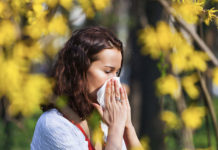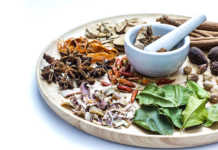
BY JOYCE JOHNSON, ND
As new buds are forming on the trees, people who suffer from allergies are getting ready to tackle another allergy season. For the most part, spring and summer are the most difficult months for allergy sufferers. This is a time when itchy and watery eyes, sneezing and even an exacerbation of asthma may occur. As a naturopathic doctor, I see a large number of patients presenting with these complaints at this time of the year.
In order to give a little background information on what happens in your body when allergies are plaguing you, imagine allergens as foreign invaders. These allergens enter your body and attach themselves onto your mucous membranes. Mucous membranes line your nose and respiratory tract.
When that allergen (pollen, mold, dust and dander, among others) attacks, your body responds by releasing histamines to try to get rid of the invader. When you have a histamine release, symptoms such as sneezing, watery eyes, itching, and even difficulty breathing (in asthmatics) can occur. To rid yourself of allergies, you must reduce the inflammation and hyper-reactivity in your body, and the first place to start is your gut.
Your digestive system is another barrier to the external world and your bloodstream. The health of this barrier and its ability to function properly play a role in your overall health. Your stomach has acids and digestive enzymes that break down potentially allergenic proteins, and your intestinal wall is the barrier that prevents these proteins from entering your bloodstream. Your intestines also have bacteria and immune cells that help to break down proteins and get rid of other molecules that can result in inflammation. When your gut barrier is weakened by chronic exposure to foods that irritate and inflame it, food proteins can pass through, a condition known as leaky gut.
According to Stephanie Rubino, a naturopathic doctor based in Richmond Hill, Ontario, supporting the health of both the digestive and immune systems is key. Dr. Rubino recommends reducing inflammatory foods in your diet and supporting the gut with probiotics, digestive enzymes and L-Glutamine. A personalized approach to treating your allergy symptoms is best achieved by speaking to your naturopathic doctor.
NUTRITION
In general, following a non-allergenic diet is recommended. If you already have food allergies and/or sensitivities, your immune system will readily react to external allergens. Limiting your consumption of wheat, dairy and sugar, among other inflammatory foods, can help reduce the overall reaction your body is creating. Do consume a whole foods diet including berries, apples, pears, lots of vegetables, and lean proteins—especially fish and legumes.
A Greek study published in Thorax found that following the Mediterranean diet, known to be rich in fruits and vegetables, has a protective effect for children with asthma and allergies. In addition, research published in the European Journal of Clinical Nutrition found that a high content of omega-3 fatty acids was associated with a decreased risk of allergic sensitization and allergic rhinitis.
FOOD ALLERGY
Food allergy is emerging as a new public health issue. It can be defined as adverse physical symptoms associated with abnormal immune reactions to food exposure. The severity of symptoms can vary from mild to life threatening. Risk factors for developing food allergies may be genetic and/or due to lifestyle choices including hygiene, exposure to sun, smoking, and environmental pollutants, according to research published in Clinical and Experimental Allergy and Pediatric Allergy and Immunology.
Genetic predisposition has been identified as a strong risk factor for food allergies with studies showing the prevalence being greater in children with a family history of allergy than children without it. Other research points towards the possible role of vitamin D, or lack thereof, in the incidence of food allergy. An American study suggested that low sunlight, and possible suboptimal vitamin D status at birth may result in food allergy development in children. Much research exists to speculate a variety of causative nutrients and factors in the development of food allergy in children. However, this still remains to be seen, as more large-scale randomized trials need to be conducted to validate these many hypotheses.
In order to briefly address peanut allergies, it was previously thought that early exposure would increase the incidence of peanut allergy in children. A few years ago, the Canadian Paediatric Society published a position statement, which has been endorsed by the Dieticians of Canada, stating that there is no evidence that delaying the introduction of allergens like peanuts, fish, or eggs over the age of six months helps to prevent allergies.
NATURAL HEALTH PRODUCTS FOR ALLERGY RELIEF
Butterbur
Butterbur can be used as an effective alternative to antihistamines. Researchers have found that butterbur decreases nasal inflammatory mediators and decreases nasal symptoms in patients with allergic rhinitis. A word of caution though, butterbur is in the same family as ragweed, therefore it could worsen allergy symptoms in some cases.
Vitamin C with Bioflavonoids
Vitamin C prevents the formation of histamine in the body. High levels of vitamin C work to lower levels of histamine in the body, and help break it down faster. Bioflavonoids enhance the activity of vitamin C and help stabilize mast cells, which secrete the histamine linked to allergic reactions. There is some evidence that vitamin C levels in asthmatics may be lower and that taking vitamin C supplements may decrease the incidence of exercise-induced asthma.
EPA/DHA Fish Oils
Eicosapentaenoic acid (EPA) and docosahexaenoic acid (DHA), the components of omega-3, are anti-inflammatory in nature. A study published in the Annals of Nutrition & Metabolism and completed in Germany found that adult females with a high fish and DHA intake have a lower rate of allergic sensitization. Omega-3s can be most commonly found in cold-water fish, nuts, such as walnuts, and flaxseed oil.
L-Glutamine
In studies, L-Glutamine has been shown to protect against the breakdown of the mucosal layer in the gut. Glutamine prevents deterioration of gut permeability and preserves the cells lining the intestinal wall. L-Glutamine is an essential amino acid supplement for healing leaky gut.
Probiotics
Probiotics may modulate immune responses in allergic rhinitis. They also support gut health by increasing immune system antibodies, whose job is to prevent bad proteins or substances such as bacteria, viruses, or food or environmental allergens, from adhering to the epithelial cells that line the gut and airways. In a review of 23 randomized trials, researchers found that those who took either a probiotic supplement or consumed foods rich in probiotics, had improved allergy symptoms and overall quality of life.
Quercetin
Quercetin helps stabilize mast cells and prevents them from releasing histamine. It can help to repair the gut, improve the immunity in your mucus membranes, thereby decreasing reactions to seasonal allergens, and reducing food allergies. VM












